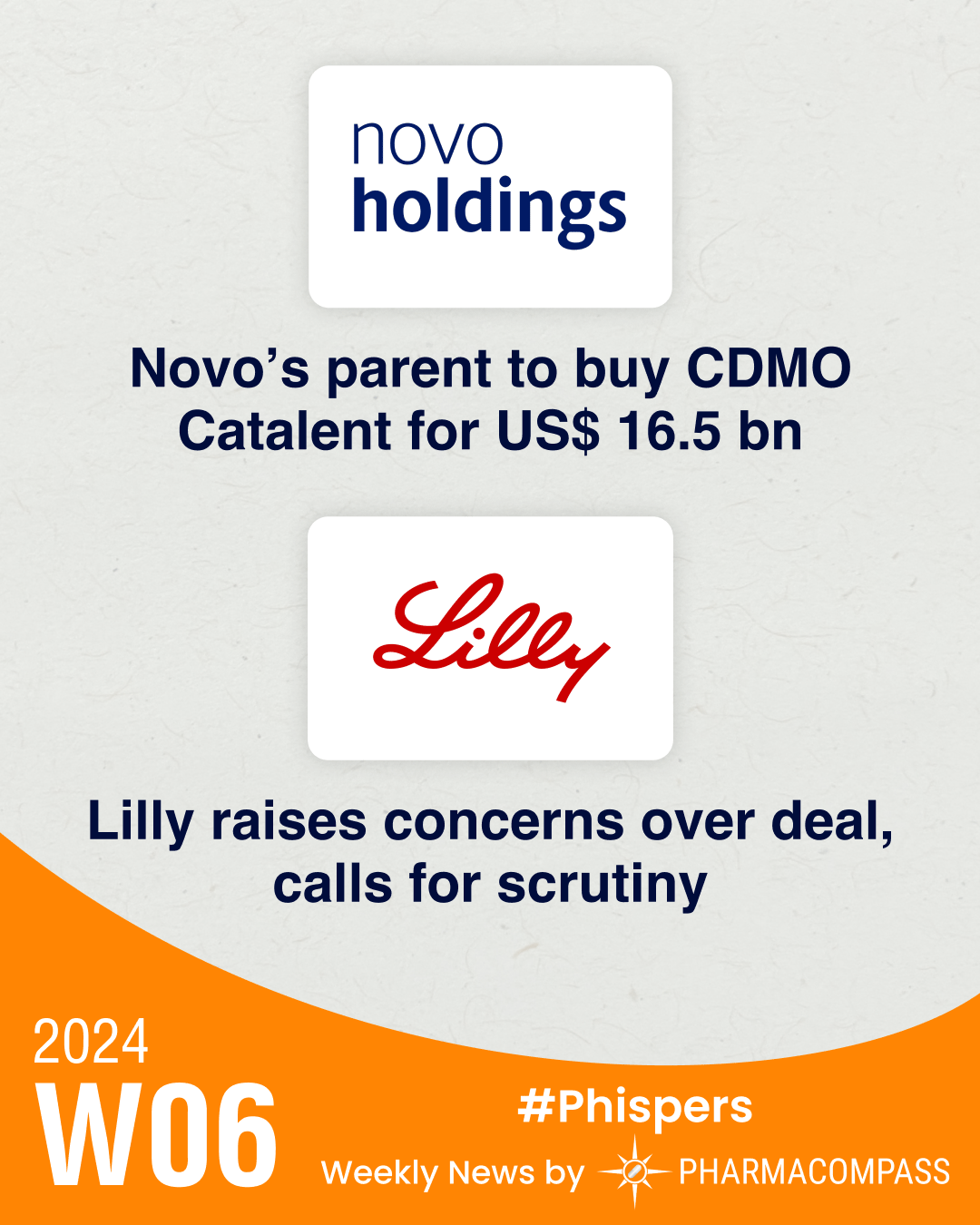
By PharmaCompass
2024-02-08
Impressions: 1,280 Article || 2 Video
The Novo Nordisk-Eli Lilly rivalry over obesity drugs got intensified with Novo Nordisk’s parent company acquiring contract development and manufacturing organization (CDMO) Catalent for US$ 16.5 billion. Lilly has called for regulatory scrutiny of the deal as it relies on Catalent for its diabetes and obesity meds.
Novartis has acquired German biopharma MorphoSys for US$ 2.9 billion, thereby gaining its hands on a promising rare bone-marrow cancer treatment — pelabresib.
In news from clinical trials, Amgen has a promising weight loss drug in the works — MariTide — which could prove more effective than Novo’s Wegovy and Lilly’s Zepbound. In two separate trials, Johnson & Johnson’s experimental drug — nipocalimab — showed promise in treating myasthenia gravis and reducing the severity of Sjögren’s disease (SjD). Both are immune disorders. And FDA has asked Gilead to pause all blood cancer trials of its drug magrolimab due to increased risk of death.
Novo’s parent buys Catalent for US$ 16.5 bn; to sell three sites to drugmaker
Novo Nordisk’s parent company, the Novo Nordisk Foundation, is acquiring Catalent through its investment arm Novo Holdings for a total of US$ 16.5 billion. Novo Holdings will then sell three of Catalent’s “fill-finish” sites to Novo Nordisk for US$ 11 billion. The deal is expected to allow the Danish drugmaker “to serve significantly more people living with diabetes and obesity.”
Novo Nordisk doesn’t expect any antitrust issues with the deal as it is acquiring only three of the roughly 50 sites Catalent operates. These sites are in Bloomington (Indiana, the US), Brussels (Belgium), and Anagni (Italy).
Lilly calls for scrutiny: Eli Lilly has called for scrutiny by competition regulators over the US$ 16.5 billion Novo Holdings-Catalent deal. CEO David Ricks has called the deal “unusual”, and the company plans to hold Catalent accountable to its contract. Lilly relies on Catalent to produce some of its diabetes and obesity treatments that compete with Novo’s Ozempic and Wegovy. A report published in The Wall Street Journal said Eli Lilly executives are worried about the deal, which seeks to expand Novo Nordisk’s weight-loss drug production and might hinder their own capability to get drugs to customers. Both Novo and Lilly have been struggling to meet the demand for their weight loss meds, and both have been working on expanding their manufacturing capacities.
FDA finds quality lapses, ‘pest’ at Catalent plant: Reuters has obtained an FDA report on Catalent’s Bloomington (Indiana) factory that says it had recorded 194 deviations between October 31, 2021 and October 31, 2023. Catalent had failed to identify the root cause of 171 of those incidents, it added. The agency also found a “pest” on the manufacturing line. FDA had conducted an inspection last year (between October 31 and November 15) that noted five separate observations, including failure to thoroughly review unexplained discrepancies in certain batches.
Novartis buys MorphoSys for US$ 2.9 bn, gains promising bone-marrow cancer med
Novartis is acquiring cancer treatment developer MorphoSys for € 2.7 billion (US$ 2.9 billion). With this, the Swiss drugmaker’s pipeline gets a rare bone-marrow cancer treatment — pelabresib — that holds plenty of promise. The drug is in late-stage trials.
AbbVie raises 2027 sales forecasts for Skyrizi, Rinvoq: AbbVie has lifted its 2027 sales forecast for Skyrizi (risankizumab) and Rinvoq (upadacitinib) by US$ 6 billion to US$ 27 billion. Its 2024 sales forecast for the two immunology drugs is US $16 billion – US$ 10.5 billion for Skyrizi and US$ 5.5 billion for Rinvoq. The drugmaker has been turning to its newer immunology drugs to counter declining sales of its blockbuster arthritis medicine Humira (adalimumab).
Amgen’s weight-loss drug shows impressive results in early-stage trial
An early-stage study suggested that Amgen’s experimental weight-loss drug MariTide (maridebart cafraglutide) could have longer-lasting effects than popular glucagon-like peptide-1 medicines, such as Novo Nordisk’s Wegovy and Eli Lilly’s Zepbound.
After 12 weeks on the highest MariTide dose, obese patients without diabetes saw a 14.5 percent reduction in body weight. Even patients on the lowest dose lost 7.4 percent weight after just three doses. This compares to Zepbound and Wegovy that showed weight loss of 21 percent and 15 percent, respectively, in trials conducted over a year.
J&J’s closely watched autoimmune drug succeeds in mid, late-stage trials
One of Johnson & Johnson’s most watched experimental drugs saw positive mid and late-stage results in the treatment of two autoimmune disorders. In a phase 3 study, nipocalimab, significantly reduced symptoms of generalized myasthenia gravis (GMG). And, in a phase 2 study, it helped reduce the severity of Sjögren’s disease (SjD). GMG weakens the skeletal muscles and particularly affects control of the limbs, throat, mouth and eyes. SjD is an immune disorder that is identified by symptoms like dry eyes and dry mouth. The data further supports J&J’s expectations of over US$ 5 billion for the drug.
4DMT posts positive mid-stage data for eye therapy: 4D Molecular Therapeutics released mid-stage interim data that showed its gene therapy, 4D-150, was well tolerated and effective in patients with wet age-related macular degeneration (wet AMD). Due to frequent injections required for the condition, the treatment burden on patients is high. The high-dose version of 4D-150 reduced standard-of-care injections required by patients by 89 percent. Furthermore, 63 percent of the 51 participants were injection-free through 24 weeks.
FDA pauses Gilead’s blood cancer drug trials over increased risk of death
Gilead said the FDA has paused all trials of its drug magrolimab in the treatment of two blood cancers – acute myeloid leukemia (AML) and myelodysplastic syndromes (MDS) – because of increased risk of patient death (when used in combination with azacitidine plus venetoclax). The company will discontinue testing the drug for all blood cancers and review its safety in studies concerning the treatment of colon and breast cancers. Magrolimab was the lead candidate of Gilead’s US$ 4.9 billion acquisition of Forty Seven in 2020.
New reporting norms for drugmakers: FDA is giving drugmakers and others involved in medicine manufacturing three weeks to comply with new reporting requirements set up to help the agency mitigate possible drug shortages. The obligations are part of the Coronavirus Aid, Relief, and Economic Security (CARES) Act passed in March 2020. On February 5, the agency had published a final guidance on how drugmakers must report the amount of each listed drug manufactured, prepared, propagated, compounded, or processed for commercial distribution.
The PharmaCompass Newsletter – Sign Up, Stay Ahead
Feedback, help us to improve. Click here
Image Credit : Phisper Infographic by PharmaCompass license under CC BY 2.0
“ The article is based on the information available in public and which the author believes to be true. The author is not disseminating any information, which the author believes or knows, is confidential or in conflict with the privacy of any person. The views expressed or information supplied through this article is mere opinion and observation of the author. The author does not intend to defame, insult or, cause loss or damage to anyone, in any manner, through this article.”






